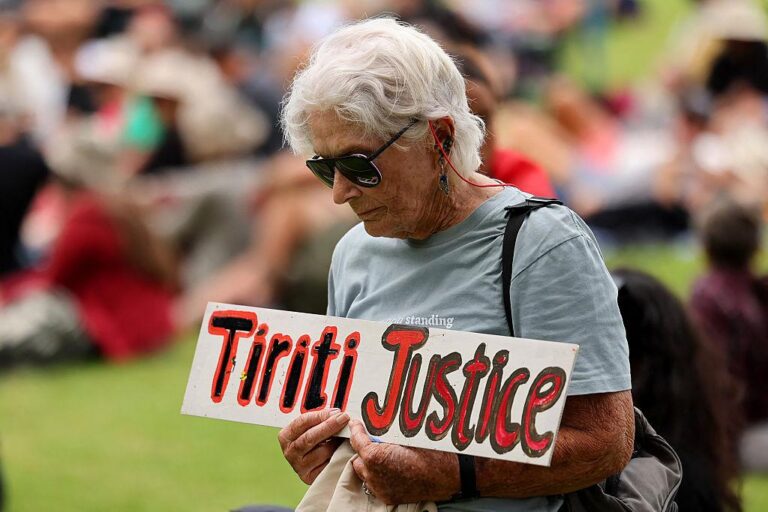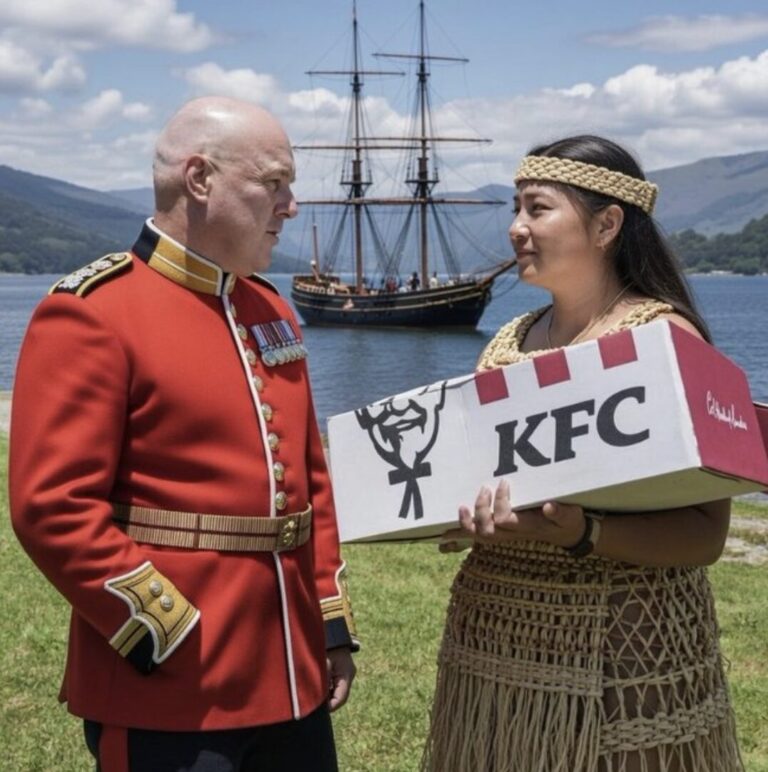After Ratana.
CHRIS HIPKINS found himself in an impossible situation yesterday (24/1/23). He had come to the tiny village of Ratana at the side of his Prime Minister, Jacinda Ardern. At what would be her last official public engagement in that role, he could not possibly upstage her. His job was to smile and mouth platitudes. He was there to “introduce” himself to the assembled leaders of Maoridom and convince them that he will be a fitting replacement for the most accommodating prime minister Māori have ever had. He knew that this would be Jacinda’s day – her last chance to bask in the unalloyed love and support of her followers. He simply could not afford to be seen to overshadow he last chance to shine.
The other Chris, however, National’s Christopher Luxon, was under no such obligation. He came to Ratana with a message to deliver. That message was not for the assembled Māori leaders, or, at least, not primarily for them. Luxon’s message was aimed squarely at all those Pakeha conservatives who have for many months been openly sceptical of National’s willingness to take a strong stand against Co-Governance, He Puapua and Three Waters. Ardern’s resignation and the uncontested election of Chris Hipkins to replace her had made the delivery of an unequivocal repudiation of all three of these racially-charged propositions a matter of urgency. Luxon and his advisers knew that if National didn’t stake out its position immediately, then the Hipkins-led Labour Party would beat them to the punch.
And Luxon did stake out a clear – or should that be clearer – position. His remarks concerning co-governance, recorded by RNZ-National’s reporters, left little room for misunderstanding:
“I think it has been quite a divisive and immature conversation over recent years and I personally think it’s because the government hasn’t been upfront or transparent with the New Zealand people about where it’s going and what it’s doing […..] We believe in a single coherent system – not one system for Māori and another system for non-Māori – for the delivery of public services. Things like Health, Education, and Justice, and critical infrastructure like Three Waters. It doesn’t mean that we don’t want Māori involved in decision-making and partnering with [non-]Māori, [but] we have a princip[led] objection because New Zealand has one government: it’s elected by all of us, it’s accountable to all of us, and its public services are available to anyone who needs them.”
Clear enough for the Pakeha conservatives? Possibly. But, for many on the Right National remains the party of John Key. The same John Key who secretly dispatched Te Pāti Māori’s Pita Sharples to the United Nations in New York to sign on behalf of all New Zealanders the UN Declaration on the Rights of Indigenous Peoples (UNDRIP). The very same UNDRIP that Labour’s Helen Clark had refused to sign, because, with her much deeper understanding of the indigenous debate, she understood that the Declaration posed a direct threat to the constitutional integrity of the sovereign New Zealand state.
Those same conservative Pakeha also know that National is the party of Chris Finlayson who, while New Zealand’s Attorney-General and Treaty Settlements Minister did more to hasten the fulfilment of the Māori nationalist agenda than any politician not named Mahuta or Jackson. They know that an extremely radical reading of te Tiriti o Waitangi has already been deeply entrenched in the New Zealand Public Service (bolstered by the Treaty principles written into legislation) and is steadily transforming the way in which New Zealand is administered, as well as raising serious doubts about the long-term future of private property rights.
There is also serious doubt on the right of New Zealand politics that Luxon and his advisers have even read – let alone understood – the He Puapua Report. Their fear is that, as the Māori nationalist, Donna Awatere, observed back in the early-1980s, Pakeha politicians will continue to remain blind to virtually every aspect of the nationalists’ project, and that it is this, the Pakeha’s racist refusal to take Māori sovereignty seriously that offers its promoters their best chance of success. Moreover, when two Labour prime ministers in a row have proved themselves incapable of answering basic questions about the content of te Tiriti o Waitangi, it’s difficult not to concede that Awatere and the conservatives have a point!
While it is certain that Luxon’s statements at Ratana constitute a direct conceptual challenge to the transformative constitutional project posited by the authors of He Puapua, what is much less certain is whether the National leader – unlike the leader of the Act Party, David Seymour – grasps just how much of the basic infrastructure of co-governance has already been constructed. Having drawn his line in the sand at Ratana, Luxon cannot now avoid arriving at the same political destination Seymour reached more than two years ago. The point where he realises that the progress towards a racially bifurcated, co-governed Aotearoa can only be halted by enshrining a conservative reading of te Tiriti in law, and by rooting-out with ruthless thoroughness all of the structures and procedures that have grown out of the radical reading of te Tiriti’s meaning.
The daunting challenge confronting Chris Hipkins is how to regain the initiative from Luxon without locking himself into the same conservative logic currently drawing National and Act inexorably towards a maximalist, Pakeha-driven, revision of the Treaty’s constitutional, political and cultural significance. Between now and the October General Election, Hipkins and his party are going to have to learn to take Māori nationalism seriously. Because Luxon is right, Labour’s handling of this issue, to date, has been divisive and immature. The new prime minister could do a lot worse than sit down with an old one, Helen Clark, and learn a few home-truths about the deadly seriousness of the indigenous forces seeking to take their country back.
Hipkins’ first and most obvious move is to announce that the Three Waters legislation will be repealed, pending a broad and thorough examination of the project’s all-too-obvious political and economic shortcomings. Pushing the pause button on this extraordinarily unpopular project will be good, practical, “bread-and-butter” politics. Were the new prime minister to follow it up with a promise to initiate an equally broad and thorough democratic debate about the moral and practical status of the Tiriti/Treaty in twenty-first century New Zealand, the public response might be even more positive – especially if the right of all schools of historical and constitutional thought to freely contend with one another was guaranteed and by Hipkins’ Government.
Jacinda Ardern’s greatest contribution to her country’s evolution was to reinvigorate the idea that politics should be about more than conventional administration and “responsible” financial management. She made us believe again that a person’s reach should exceed their grasp. “Jacinda” was a ray of sunlight through the drear neoliberal darkness. In that shaft of sunlight she showed us a new and wonderfully different nation. The task she has bequeathed to her successor – and her people – is to create the road that will take them there.







“Hipkins’ first and most obvious move is to announce that the Three Waters legislation will be repealed, pending a broad and thorough examination of the project’s all-too-obvious political and economic shortcomings. Pushing the pause button on this extraordinarily unpopular project will be good, practical, “bread-and-butter” politics. Were the new prime minister to follow it up with a promise to initiate an equally broad and thorough democratic debate about the moral and practical status of the Tiriti/Treaty in twenty-first century New Zealand,”
I wont hold my breath!
Chippie is Ardern in a pseudo Westie guise – all done for public consumption. Emperor’s new clothes sadly.
Great stuff Stevie – While learning Te Reo is a good idea, if we are to better understand Maori concerns and aspirations, being fluent in the language politicians speak is an even better one
Maori Nationalism – where?
Maori Government – where?
this is all such a non-sequitur – I can’t believe so much rent is being charged in so many heads over a report (He Pua Pua) and shared governance (decision-making/partnership) over natural resources (3 Waters) and public services (Maori Health Authority).
I can’t see how any of these breach what Luxon is actually saying
“It doesn’t mean that we don’t want Māori involved in decision-making and partnering with [non-]Māori [but] we have a princip[led] objection because New Zealand has one government”
And? All of this is being implemented under the NZ Government. What other government is he referring too? An imaginary one like his Sky Father?
What a bloody joke and whoever believes this has Maori living in their head for free. Maybe it’s a Mokomokai?
Yet it’s Labour that is dividing us. Yeah. Right. Maybe Labour is just bringing out the hate and division that is already there.
You got it! Division is what we claim when we don’t get our own way.
Totally agree billid and Peter. It’s not racist, it’s a right wing strategy to divide. It does have racist connotations though.
Luxon’s message was aimed squarely at Pakeha conservatives? It’s a strange world.
Luxon goes to a place of Māoridom. A place the Pakeha conservatives don’t like because it’s separatism. A place they don’t agree with because it’s a private religious thing and why should politics and politicians have any special exposure there?
Any way he is there and Luxon comments on Māori seats but does not have the balls to say that on his ‘Day One in the Job List’ he will have, “Instigate direct action to get rid of Māori seats.”
The last Trotter paragraph sums up an essence the scared little white men cannot get, will never get, do not want to get. The Arden enlightenment is submerged many fathoms below a sea of ignorance, fear and arrogance. David Seymour and Christopher Luxon will trawl a rich bounty.
It sums u
READING BETWEEN THE LIES (Luxon’s speech)
”We believe in a single coherent system – not one system for Māori and another system for non-Māori ‘
Translation:
The single coherent system as it stands keeps Pakeha like me rich and Maori poor and that is fine by me.
”It doesn’t mean that we don’t want Māori involved in decision-making and partnering ”
Translation.
Some of my best friends are Maori- no really – Paula, Shane, Simon, my security guards.
“New Zealand has one government,it’s elected by all of us,”
Translation
It is elected by anyone who still votes. a lot of you faced with a choice between tweedle dum and tweedle dee have just given up.
“‘ It is accountable to all of us”
Translation
Now it is time for the jokes! ( Oranga Tamariki, New Zealand Police ,MSD and accountability.
Excellent summary of his comments.
The labour movement has forgotten that a progressive, internationalist solution to the racial question was already being widely implemented in the 1970s: integrationism.
Desegregation (i.e. the replacement of ghettos with new mixed suburbs), slum clearance, mass public housing projects, Full Employment Policy, industrial development — at one time, this had bi-partisan support.
By failing to promote these policies, the field is left open for Black Nationalists to claim that racialistic chauvanism is the “only solution”.
This has proven to be disastrous in South Africa, where inside the A.N.C. the nationalists have sidelined organised labour — to the point where living standards have drastically fallen, while the B.E.E. Policy has done no more than enrich a tiny elite of tribal businessmen.
Didn’t South Africa get a job done on it by the World Bank and the IMF?